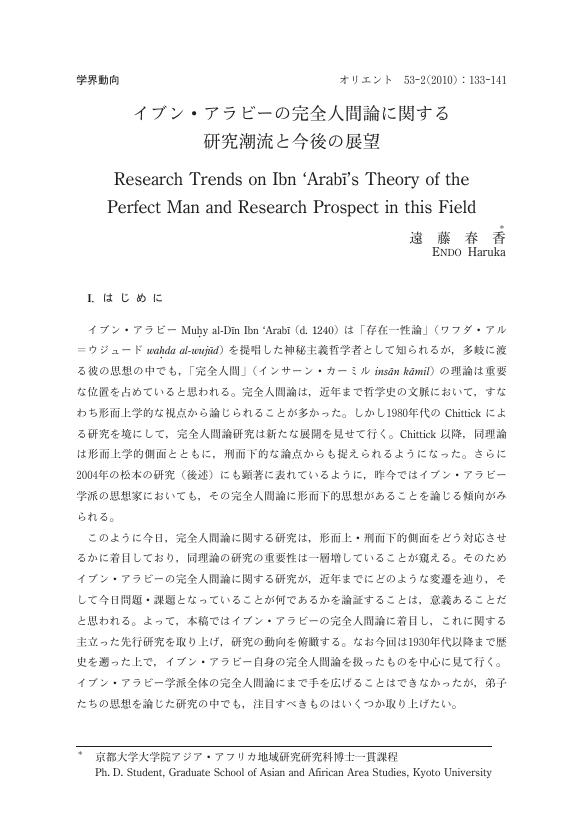2 0 0 0 OA イブン・アラビーの完全人間論に関する研究潮流と今後の展望
- 著者
- 遠藤 春香
- 出版者
- 一般社団法人 日本オリエント学会
- 雑誌
- オリエント (ISSN:00305219)
- 巻号頁・発行日
- vol.53, no.2, pp.133-141, 2011-03-31 (Released:2014-04-02)
1 0 0 0 OA シャアラーニーの完全人間論
- 著者
- 遠藤 春香
- 出版者
- 一般社団法人 日本オリエント学会
- 雑誌
- オリエント (ISSN:00305219)
- 巻号頁・発行日
- vol.55, no.2, pp.17-32, 2013-03-31 (Released:2016-04-26)
This paper discusses ‘Abd al-Wahhāb al-Sha‘rānī’s theory of the Perfect Man (insān kāmil), and examines his contribution to the history of Islamic thoughts. Sha‘rānī (d. 1565) was a Sufi thinker in Ottoman Egypt who belonged to the school of Ibn ‘Arabī (d. 1240). The focus of this paper is to analyze how Sha‘rānī inherited and developed Ibn ‘Arabī’s theory. The Perfect Man, as it is argued by Ibn ‘Arabī, refers to one who has attained unity with God and thereby attained the supreme state in Sufism. According to Ibn ‘Arabī, man was made in the image of God before the beginning of God’s creation of other creatures and therefore is capable of manifesting each of the names and attributes of God. The Perfect Man as a locus of God’s manifestation can synthesize two truths about God: God’s transcendence (tanzīh) and immanence (tashbīh), and God as the One and the many. The presence of the Perfect Man is important because he unifies the cosmos and keeps it one. This metaphysical theory of the Perfect Man taught by Ibn ‘Arabī was inherited by his followers. Many of them discussed the concept from the ontological point of view. However, Sha‘rānī, besides explicating the Perfect Man from the ontological aspect, developed it further by translating it into the social context. He developed the idea of the Perfect One (al-kāmil), who, according to Sha‘rānī, witnessed the source of the law (‘ayn al-sharī‘a) through a mystic experience. The various opinions of various people were originally derived from this source of the law. Thus, according to Sha‘rānī, the Perfect One can solve tensions that exist in society, since the Perfect One realizes the source of the law, into which opposing opinions can be ultimately resolved. Sha‘rānī thought that the splits of society into various parties can be unified through such a person. As this paper shows through its analysis, the Perfect Man and the Perfect One are the same concepts. Both hold within them the plane of God’s names and attributes and unify various dichotomies in the world. However, while the Perfect Man unifies the cosmos, the Perfect One unifies the society. attempted to contextualize the metaphysical-ontological concept of the Perfect Man in order to meet the needs of the society of his time. This paper concludes that, by applying Ibn ‘Arabī’s theory to this world, Sha‘rānī played an important role in further spreading Ibn ‘Arabī’s thoughts among the people of the Arab world.
